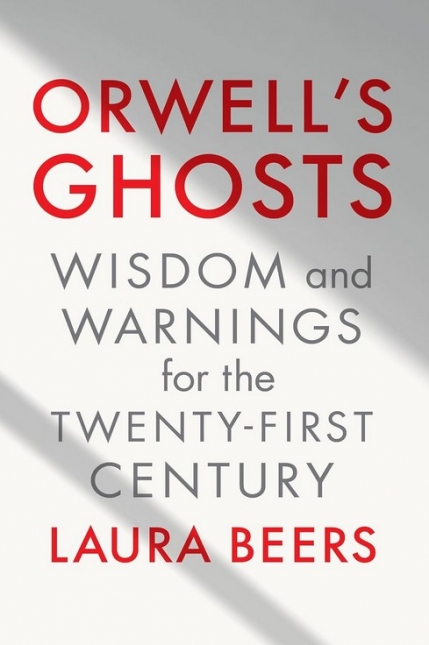Orwell’s Ghosts: Wisdom and Warnings for the Twenty-First Century
- By Laura Beers
- W.W. Norton & Company
- 240 pp.
- Reviewed by John P. Loonam
- June 27, 2024
What an astute author from the past might say about our murky present.

Even in our current partisan divide, it seems both left and right can agree on one principle of political discourse: The other side’s policies aren’t just bad, they’re downright Orwellian.
Whether it’s right-wing hysteria about tech companies banning free speech or the left’s complaint that MAGA Republicans are rewriting the history of January 6th, both sides cite Orwell as their inspiration. Daniel Patrick Moynihan told us we’re entitled to our own opinions — and despite his warning, increasingly to our own facts — but are we really entitled to our own Orwell, too?
Historian Laura Beers takes on this question in Orwell’s Ghosts, producing a sleek, efficient, and powerful argument that we are not, that Orwell’s writing was too clear and his assessment of society too honest for infinite flexibility. She brings his thinking into the 21st century, finding significant flaws in his work but also great clarity and honesty.
Beginning with a capsule biography, Beers makes clear that Orwell’s most famous books, Animal Farm and 1984, don’t capture the full spectrum of his views but are rather “the culmination” of decades of political writing. His experiences at Eton, his time in India in service of the Raj, his investigations of poverty in Paris, London, and North England, and his experience of civil war in Spain made him as committed to socialism as he was anti-fascist, as much a truth-teller as a polemicist.
One of the commonsense strengths of this book is that Beers doesn’t cherry-pick Orwell’s beliefs but keeps in mind his anti-authoritarianism, his democratic socialism, and his reverence for the truth. The combination makes him less useful for partisan rhetoric but a better guide to political thought in general. Right-wingers like Josh Hawley and Donald Trump may want to use Orwell to condemn what they see as government overreach, but their fealty to “alternative facts” runs against the heart of his worldview. After all, his definition of free speech in 1984 doesn’t allow one to say just anything; it’s the freedom to tell the truth, “the freedom to say that two plus two make four.”
To Orwell, such an obvious obligation is not so easily met. He achieves his own honesty only through ruthless self-criticism. He scrutinizes, for instance, his participation in British imperialism in essays like “Shooting an Elephant” and “A Hanging” and finds it inherently racist. In The Road to Wigan Pier, he debunks his prior middle-class assumptions about poverty, and he reports the cynical hypocrisy of his communist comrades in Spain in Homage to Catalonia. Beers analyzes all of it.
Orwell’s Ghosts, however, is by no means hagiography. Despite her obvious respect for him, Beers doesn’t hold Orwell up as a role model, examining his misogyny in both writing and in life, evaluating the evidence that he was guilty of sexual assault against girlfriends, and highlighting his dismissal of female characters as simple sensualists.
Beers makes clear that Orwell saw the crisis of capitalism in class terms, with a lesser interest in race, and was blind to the ways gender reinforced the problems of inequality and injustice that he cared so much about. Nor does she allow long-ago social mores to let Orwell off the hook, declaring that he “was indisputably a chauvinist, even by the standards of his day.”
But Beers holds Orwell’s sexism to account without allowing his thinking to be dismissed. She makes a strong case that exploring his writing in full is an avenue to better understanding his time and our own. While the book is primarily focused on Orwell’s era, Beers points to lessons he offers for the 21st century, discussing Trump, Joe Biden, London’s response to covid-19, cancel culture, Florida’s “Don’t Say Gay” law, the surge in book banning, the work of economist Thomas Piketty and sociologist Matthew Desmond, and the global Black Lives Matter movement.
One important aspect of Orwell’s Ghosts is that no prior knowledge of his writing is required. While Beers’ analysis might make you want to check out, say, Burmese Days or “Politics and the English Language” for yourself, her presentation of Orwell’s ideas is clear and crisp enough that even someone who’s never read him can follow her arguments perfectly. Still, I think I’ll admire her work even more after I turn back to his.
John P. Loonam has a Ph.D. in American literature from the City University of New York and taught English in New York City public schools for over 35 years. He has published fiction in various journals and anthologies, and his short plays have been featured by the Mottola Theater Project several times. He is married and the father of two sons; the four have lived in Brooklyn since before it was cool. His first novel, Music the World Makes, will be published by Frayed Edge Press in 2025, while a collection of his short stories, The Price of Their Toys, is forthcoming from Cornerstone Press.

